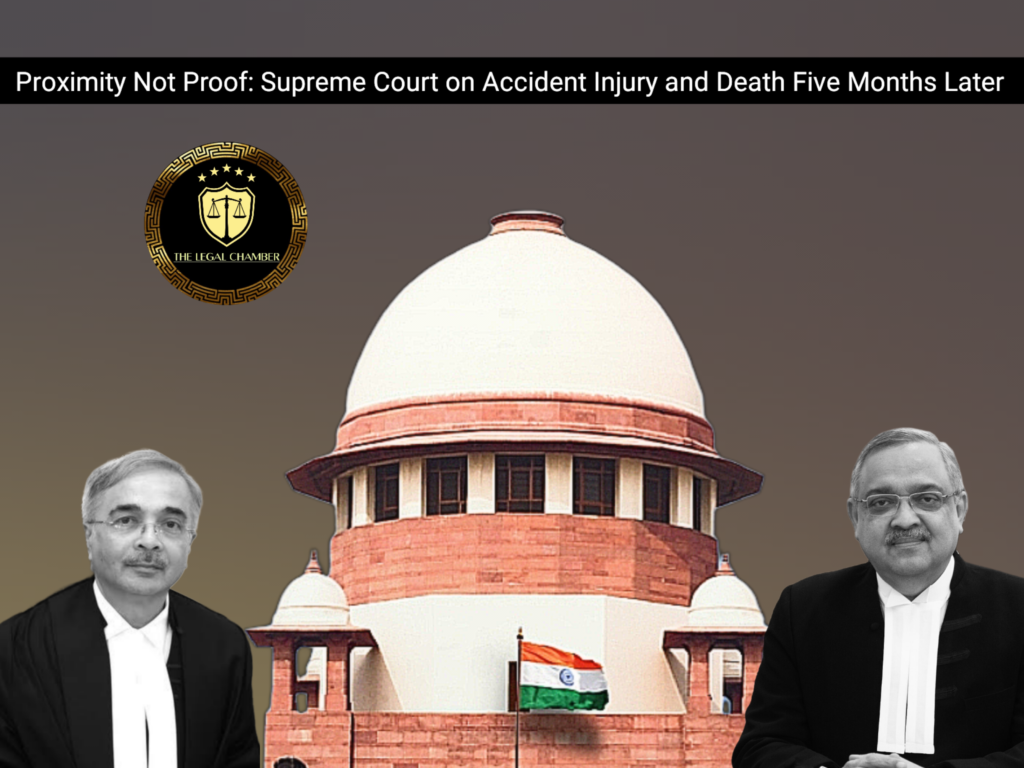
The Supreme Court dismissed the appeal, upholding the High Court’s finding that the death was not a direct consequence of the motor accident injuries. The legal requirement of establishing a direct causal nexus between the accident and the death was not satisfied, as the medical evidence indicated the fatality was a possible after-effect of the surgery and the victim’s pre-existing conditions, not the injuries themselves.
Facts Of The Case:
On April 29, 2006, an Excise Guard died following injuries sustained in a motorcycle accident. The accident occurred when the motorcycle he was riding collided with another motorcycle. He was initially hospitalized from April 29 to May 3, 2006, for injuries including a compound fracture of multiple metatarsals in his right foot and a fracture in his left little finger. After discharge, he continued outpatient treatment for a non-healing ulcer on his right foot. This condition eventually led to his referral to a higher medical centre for plastic surgery. He was admitted on September 18, 2006, and underwent a skin grafting procedure on September 21, 2006. Shortly after being shifted to the post-operative ward, he developed sudden breathlessness and died the same day. The medical certificate listed the cause of death as pulmonary embolism or acute myocardial infarction. While the Motor Accident Claims Tribunal awarded compensation, finding a direct link between the accident and the death, the High Court overturned this decision. The High Court’s judgment, which was later affirmed by the Supreme Court, found the necessary direct causal connection was not established, as the death was more likely a consequence of the surgery and the victim’s pre-existing health conditions.
Procedural History:
The procedural history of this case began with the claimants filing for compensation before the Motor Accident Claims Tribunal. The Tribunal, in its initial judgment, allowed the claim, finding that the death of the victim was a direct result of the injuries sustained in the motor vehicle accident. Subsequently, the insurance company appealed this decision to the High Court. The High Court, after a detailed re-examination of the evidence, particularly the medical testimony, set aside the Tribunal’s finding on the cause of death and overturned the compensation award related to the fatality. The claimants then appealed to the Supreme Court of India, which, in its final judgment, dismissed the appeal and upheld the decision of the High Court, affirming that a direct causal link between the accident and the death was not conclusively established.
READ ALSO:Supreme Court Judgment: Key Takeaway from Vanita vs. Shriram Insurance Co. Ltd.
Court Observation:
The Supreme Court observed that the mere proximity in time between an accident and a subsequent death is insufficient to establish legal liability. The Court emphasized the necessity of proving a direct causal nexus between the injuries sustained in the accident and the cause of death. It relied heavily on the medical evidence, which indicated that the victim’s fatal heart attack was a possible after-effect of the surgical procedure undertaken for a non-healing ulcer, and was influenced by his pre-existing conditions like diabetes and high cholesterol. The Court found that the claimants failed to provide clear evidence to substantiate that the death was a direct result of the accident injuries rather than a consequence of the surgery and the victim’s own health parameters, and thus, the standard of “preponderance of probability” was not met.
Final Decision & Judgement:
The Supreme Court dismissed the appeal and upheld the impugned judgment of the High Court. The final decision denied the claim for compensation for the death of the victim, as the appellants failed to establish the requisite direct causal connection between the motor accident and the fatal heart attack. The Court found no legal ground to interfere with the High Court’s well-considered finding that the death was not a direct consequence of the accident injuries but was more likely related to the subsequent surgery and the victim’s pre-existing health conditions. Consequently, the appeal stood dismissed.
Case Details:
Download The Judgement Here